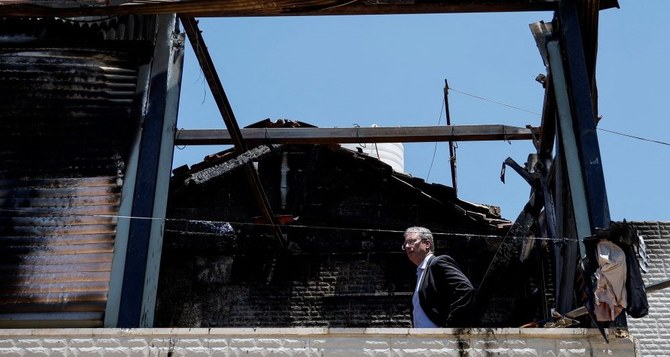
Inevitably, the horrific bloodshed of the war in Gaza has entered American political discourse. It was inevitable because the US is not a neutral force in the conflict but very much a main actor in every aspect. As such, it can make a difference — for better or for worse.
Sadly, over the past 11 months it has been for the worse and it remains to be seen how this is going to affect not only the presidential election but also congressional contests, especially in what is one of the most critical election years in American history for the future of the nation’s democratic system and its relations with the world.
As a rule of thumb, domestic issues tend to define the voting patterns of the American electorate, not foreign affairs. Nevertheless, the Electoral College system through which presidents are elected means that swing states — those in which there is no clear majority for either Democrats or Republicans but there is a concentration of voters likely to vote based on a single issue — are particularly consequential to the overall result.
For instance, in one key swing state, Michigan, official figures reveal that there are 211,405 Arab American residents (some suggest the true number is closer to twice that figure). Consequently, the votes of that community, should it mass in support of one candidate over the other in large numbers, could prove decisive, especially since the margin of victory for the winner in Michigan at the last election was relatively small.
Until President Joe Biden decided to withdraw from the race, the prospect of the Democrats winning the presidential election seemed to be slipping away toward a second term for Donald Trump, largely because of Biden’s stance on the war in Gaza.
When he stepped aside and was replaced by Vice President Kamala Harris, it provided the Democrats’ campaign with a new lease of life. But this was not necessarily because she distanced herself from Biden on Gaza — although she can, rightly, claim to have called for a ceasefire early in the war, and she can somewhat distance herself from Biden’s one-sided policies because the role of the VP in foreign policy decisions is usually quite marginal.
Part of the debate on this issue in the US, as it is in some other countries, is too simplistic. It is presented simply as a choice between pro-Palestinians and pro-Israelis, rather than a choice between those on both sides who would like to bring the carnage to an end and move on toward a permanent and peaceful solution, and those who thrive on prolonging the conflict indefinitely until some elusive idea of “total victory” is achieved.
The US is not a neutral force in the conflict but very much a main actor in every aspect.
Yossi Mekelberg
If the outpouring of sympathy for Israel and the losses it suffered on that horrific Oct. 7 day was understandable, the mood among many in the US has gradually tilted against Israel because of its disproportionate response.
It is the tens of thousands of Palestinians who have been killed in Gaza, many of them civilians and many of them children. It is the destruction of their homes, and it is the fact that Gazans have been displaced time and time again with no end in sight that has led many Americans to question US support for Israel — even if in some cases the way in which their criticisms are expressed is troubling.
What many Americans could not understand was Biden’s reluctance to ensure that the Israeli government followed the advice he gave at the very beginning of this war: Do not fight in vengeance but with a political aim in mind, and one that is within the rules of international humanitarian law.
Biden is, instinctively and sentimentally, a supporter of Israel; although at the same time his growing disdain for Prime Minister Benjamin Netanyahu and his government is clear. But his unwillingness to contain Israel and prevent it from using its military might indiscriminately cost him popularity and has left an uneasy legacy for Harris to deal with.
So far she has struggled to strike a balance, including during the Democratic Party’s recent convention when she was vocal about her commitment to Israel’s security and well-being, while at the same time ignoring pro-Palestinian protesters outside the conference hall in Chicago.
Neither political party can ignore the fact that as the war in Gaza continues, the public is not only becoming weary of it but their support for Israel is wavering.
A recent ABC News/Ipsos poll found that nearly 40 percent of Americans believe the US is doing too much to support Israel in its war against Hamas, up from about 30 percent in January. Should this trend continue, it should not only be a concern for Israel but it might cause the two main US political parties to reconsider the political price of providing the Israeli government with a blank check for how they operate, whether in Gaza, the West Bank or on other fronts, and facilitating their actions financially and through the supply of sophisticated weaponry.
A major dilemma for those upset with the Biden administration’s handling of the war in Gaza, and its inability to help bring it to an end, and in particular those who closely associate Harris with those policies, is that Trump has not suggested a better alternative.
He actually claimed, during his TV debate with Harris on Tuesday, and with no shred of evidence, that Harris hates Israel. Moreover, in one of his regressively incoherent ramblings during a speech to the Republican Jewish Coalition in Las Vegas, he claimed that should Harris be elected, “Israel is gone.”
And although he has said he urged Netanyahu to agree to a ceasefire, during their meeting at his Mar-a-Lago residence Trump stated: “He (Netanyahu) knows what he’s doing. I did encourage him to get this over with. It has to get over with, fast.”
Make of that what you will but it was just more encouragement to use more force in a shorter time span, not a plea to show more humanity toward the people of Gaza. This is hardly an appealing proposition for those who care about the lives of Palestinians there.
To vote for Trump, and his Republican allies in the House of Representatives or the Senate, would be a punitive act. After all, it was mainly Republicans who, during the summer, could not contain their enthusiasm while welcoming Netanyahu to Capitol Hill, giving him more standing ovations during his speech than anyone could remember. Meanwhile, many Democrat legislators opted not to attend.
Americans who would cast their vote primarily with the aim of ending both the war in Gaza and the wider conflict between the Israelis and Palestinians face a tough choice — but Trump can hardly be considered the one most likely to achieve this.
It might actually be a Harris presidency, considering her care for human rights and her understanding of what it means to belong to a mistreated minority, that would offer some hope for change in US foreign policy on the Israeli-Palestinian conflict. Maybe she can become the honest broker that so many in the US, and elsewhere, are hoping for.
• Yossi Mekelberg is a professor of international relations and an associate fellow of the MENA Program at Chatham House. X: @YMekelberg












